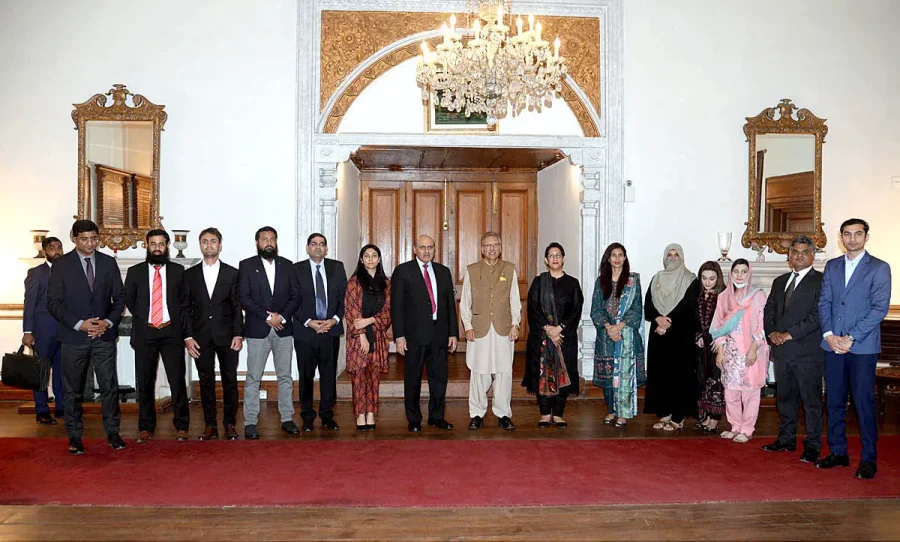President Dr. Arif Alvi on Monday stressed swift decision-making process in the country to bring it at par with the fast-changing world.
He expressed these views in an interactive session with PhD faculty and PhD International Relations scholars from the University of Lahore (UoL) here at Governor’s House, where University Rector Prof. Dr. Muhammad Ashraf and UoL think-tank’s head Dr. Rabia Akhtar were also present.
President Alvi said that the information-technology (IT) sector of Pakistan had the potential for speedy development, asserting that Pakistan had a huge number of youths who could be equipped with the IT skills as the world was looking toward Pakistan to fulfill its IT sector needs.
The president said that an educated youth and a skilled workforce were the most essential ingredients for moving forward, but unfortunately the pace of producing IT educated youth was very slow compared to the neighbouring countries.
He highlighted that the most practical and speedy way to fill the gap between the required numbers of graduates was shifting our education system to internet-based online and hybrid modes, which were now increasingly being practised very successfully in different countries.
He called upon all stakeholders to ensure that all school-going children were admitted to schools and all intermediate passing students were admitted to higher education institutions (HEIs).
He added that country’s rate of primary enrolment was only 68 per cent compared to other regional countries’ rate of over 98pc, whereas higher education enrolment was only nine per cent compared to around 60 per cent of other regional countries.
This, he said, was not sufficient to provide much-needed quality human resources required for achieving accelerated socioeconomic growth in the country. He said that the low enrolment rate at the primary level was alarming and worrisome for the entire nation.
To a question, he said that Pakistan direly needs working think-tanks to lead it towards socioeconomic development, enhanced security and people’s prosperity.
He was of the view that research and development institutes must find out the users/ sectors at first for their research/ product, otherwise their efforts and hard work would not prove to be useful or bring any good to society.
“We have to remove our shortcomings at first then we will be able to achieve a niche in the comity of nation as well as make the world listen to our viewpoint and narrative,” he opined.
The president said that knowledge and theories of every field were already available, but their proper implementation was a difficult task and the opinion-makers and decision-makers, particularly the parliamentarians, could play an eminent role in this regard, he added.
To another question, Dr. Arif Alvi said that teachers admired the generations by gradually changing their minds; however, politicians also had the ability to change the people’s minds, citing that Quaid-i-Azam Muhammad Ali Jinnah had changed the people’s minds and brought them to one point of demand for independence.
He said that today, every individual would have to play his/ her role in politics as it was the politics that directly impacted social and economic aspects of their lives.
Earlier, the rector briefed the president that the University of Lahore had total 11 faculties and several centres of excellence, 42 departments offering 200 courses and it had over 35,000 local and 400 foreign students including from Sri Lanka, Saudi Arabia, Iran, Uganda and Nigeria etc.










